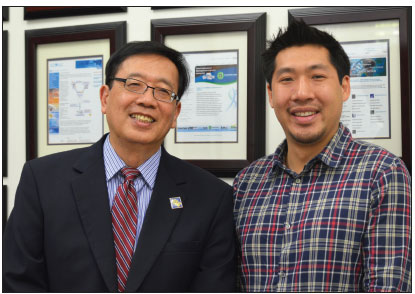Kenneth Fong: entrepreneur who educates
Updated: 2015-11-20 11:53
By Lia Zhu in San Francisco(China Daily)
|
||||||||
From successful entrepreneur to venture capitalist, Kenneth Fong is helping young people fulfill their dreams and use their education to benefit society.
The 68-year-old Fong is founder and chairman of Kenson Ventures, a venture capital firm that provides funds and strategic advice to biotechnology startups and companies. He has worked with 14 biotech companies in the past 15 years since the firm's founding in 2000.
The engagement of these companies ranges from the development of novel drugs and the discovery of genomics-based drug targets, which leads to developing research tools in molecular and cellular biology. Most of the entrepreneurs are from China and earned PhDs in the US.
"We have cultivated a number of successful entrepreneurs and some have become multimillionaires," he said.
Prior to Kenson, Fong founded Clontech Laboratories Inc in 1984, a molecular biology company that was known as the largest and earliest of its kind founded by Chinese Americans.
The Palo Alto, California-based Clontech makes the molecular biology tools that facilitate research and development in the areas of gene mapping, genetic engineering and cloning.
The company hired 400 employees, 65 of whom had PhDs, and posted revenue of $80 million with an annual growth rate of 40 percent before merging with Becton Dickinson in 1999.
"Fifteen years is a long time. It's time for me to do something else," Fong said, explaining why he sold Clontech. "When you get on a certain stage, you would like the young people to learn from you and also get successful. My experience can help them in running their own companies."
His decision was partly due to a phenomenon in the late 1990s.
The Chinese students came to the US in the mid-1980s for graduate schools in large numbers, and after an average of 17 years, they had graduated with degrees and wanted to start their own companies, he said.
"If you can help capable people doing the same thing as you do, it means if five of them can learn from you and do well, they are going to spread it out to 25 people," he said.
Fong prescribed the ingredients for success for young people: a high energy level, a core competence, a focus on one thing that one is very good at, and vision so that people will follow and stay with you.
Fong attaches great significance to education and training. "Without education, I would not know how to set up a company," he said.
Born in Guangdong province, Fong moved to Hong Kong with his family at an early age before immigrating to the US at age 20. He did a few odd jobs at gas stations and restaurants in San Francisco to support his study at a community college before he went to San Francisco State three years later as a junior majoring in biology and chemistry. While taking a full course load, he worked full time at the central kitchen of the Manning cafeteria chain.
In 1971 with a partial scholarship to Indiana University that paid several hundred dollars a month, Fong supported himself by working as a teaching assistant, while working on his PhD in molecular biology.
In 1977, he got his PhD and then became a researcher at the National Institutes of Health (NIH) at North Carolina's Triangle Park.
After six years working as a researcher, Fong started to think about what he was really good at.
"Chinese students come to America, get high education, obtain their degrees. That's what they come here for. But what are you going to do in the future? They don't know." Fong said.
It was very competitive in the world of scientific discovery, and only a few people would rise up to be the top researchers, he said.
"Maybe I am not as talented as I thought I was as a researcher. Maybe I am good at developing products and services to help the researchers to do discovery. I can be supportive to their innovation and discovery," Fong said.
In late 1983, Fong decided to take a chance with Clontech. With funding of $35,000 from his younger brother Danny and the use of some laboratory space at Danny's water analysis business, he started working on his first product in collaboration with a then- Stanford researcher, Richard Young.
In the old days, people wanted to discover genes, as they found some genes determine certain diseases, Fong said. "The first product I marketed to researchers was to help them isolate the genes," he said. "And one successful product leads you to another one."
In 1985, Clontech's sales rose to $200,000 and the next year jumped to $1 million. In the following years, the company posted 48 consecutive quarters of double-digit growth and profits.
Today, Fong nurtures the emerging biotechnology field in the Bay Area and Asia by serving on non-profit and university boards and government-sponsored institutes.
Fong also attributed his achievements to his early years, when he learned to work hard and do not complain about it.
"My father was a cook working in the kitchen. He left me nothing in terms of money. But I thank him, because we learned to do everything ourselves to make things happen. I enjoy working and helping other people," he said.
"That is how you derive happiness and pleasure from your life when you know the people you help become successful," he said. "Because if they become successful, I know they will help other people."
Fong and his wife, Pamela, both devoted philanthropists, established the Fong Optometry and Biomedical Library at the University of California, Berkeley, in 2006, and offered scholarships at San Francisco State University, Peking University and in the California State University system.
He also plans scholarships for Peking University students to obtain PhDs in finance and economics in the US.
"Because talents in the two areas will be very important to China's future," he said.
Fong was a trustee of the California State University system from 2006 to 2o13, which comprises 23 campuses and more than 430,000 students.
Fong also helped select three presidents of Asian descent for California State universities in the Bay Area from 2012 to 2014. "If you want to make a difference, you need to speak out and make your voice heard," he said.
He volunteered much of his time and resources to promoting understanding of Asian Americans. He has promised a matching fund to build a monument at Gold Run, a former settlement of early Chinese laborers in California, to recognize and commemorate those who lost their lives during the construction on the US Transcontinental Railroad 150 years ago.
The Chinese used to make great contributions to the US development by building the railroad which links the West and the East, he said. "We should remember it."
liazhu@chinadailyusa.com
|
Kenneth Fong and his son John at Kenson Ventures in Palo Alto, California. LIA ZHU / CHINA DAILY |
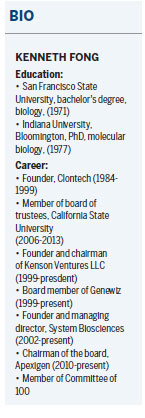
(China Daily 11/20/2015 page12)
- London tube station evacuated over security threat
- China law firm Yingke opens China Center in London
- ROK accepts DPRK's proposal for working-level talks
- DPRK proposes working-level talks with S. Korea
- France, Russia launch more strikes against IS targets in Syria
- Chinese bearing maker prepares Michigan facility

 Snow hits North China as temperature drops
Snow hits North China as temperature drops
 'Burn the Floor' thrills its Beijing audience
'Burn the Floor' thrills its Beijing audience
 Where do China's damaged currency notes go?
Where do China's damaged currency notes go?
 Shenyang's 50 gas-electric hybrid buses to hit the road
Shenyang's 50 gas-electric hybrid buses to hit the road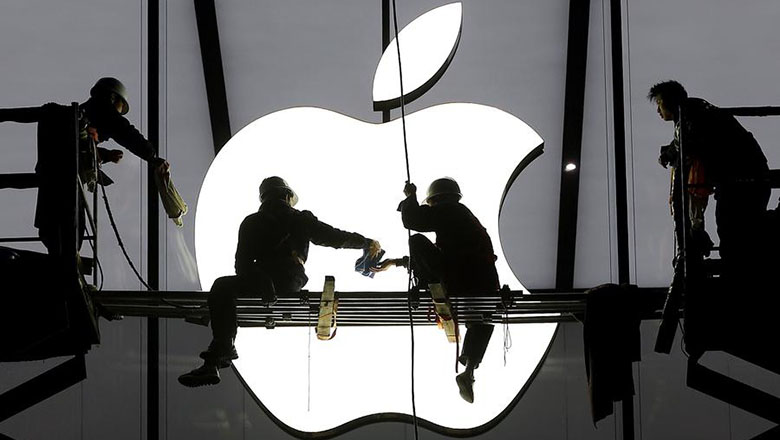
 Top 10 global innovators in 2015
Top 10 global innovators in 2015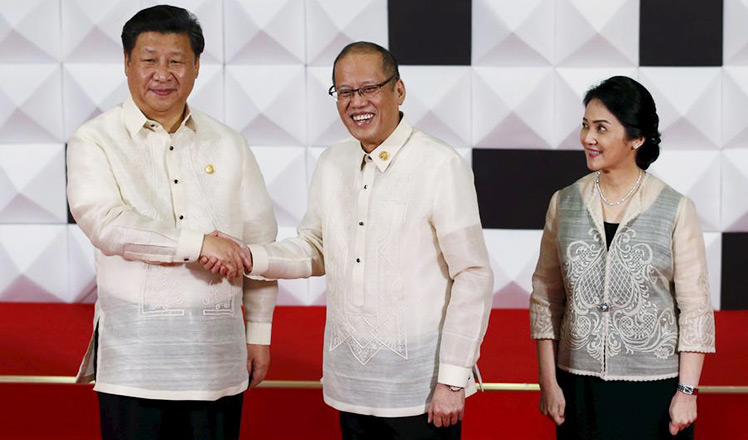
 Leaders attend APEC welcome dinner in Manila
Leaders attend APEC welcome dinner in Manila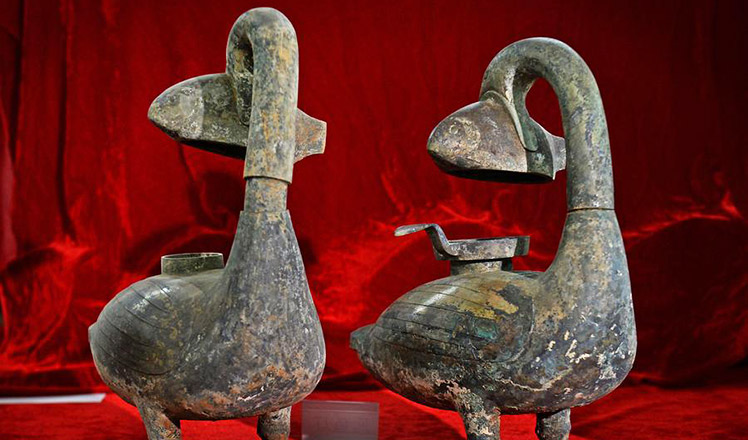
 Amazing finds unearthed at the Marquis of Haihun's tomb
Amazing finds unearthed at the Marquis of Haihun's tomb
 Automakers debut key models at LA Auto Show
Automakers debut key models at LA Auto Show
Most Viewed
Editor's Picks

|

|

|

|

|

|
Today's Top News
Chinese president arrives in Turkey for G20 summit
Islamic State claims responsibility for Paris attacks
Obama, Netanyahu at White House seek to mend US-Israel ties
China, not Canada, is top US trade partner
Tu first Chinese to win Nobel Prize in Medicine
Huntsman says Sino-US relationship needs common goals
Xi pledges $2 billion to help developing countries
Young people from US look forward to Xi's state visit: Survey
US Weekly

|

|
